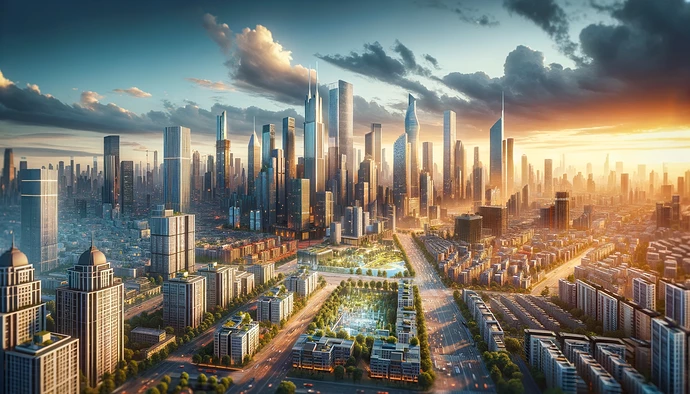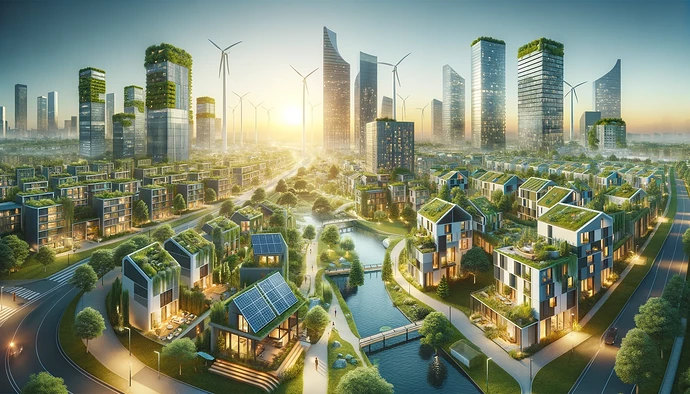Understanding Real Estate Development
What if you could unlock the mysteries of real estate development and transform every project into a landmark success?
Imagine being at the forefront of creating spaces that don’t just exist but thrive, shaping communities and skylines.
This is the essence of real estate development – a multifaceted, dynamic process that blends creativity, strategy, and execution.
Welcome to “Unlock Secrets of Real Estate Development!”, a comprehensive guide designed for the ambitious property developer.
In this in-depth post, we delve into the complex world of real estate development. From conceptualization to the final touches of a project, real estate development is not just about constructing buildings; it’s about reconfiguring the built environment to meet the evolving needs of society.
This journey requires navigating through increasing populations, evolving technologies, and changing tastes. It’s a blend of art and science, where developers, akin to movie producers, take the helm of managing numerous project facets – from vision and promotion to negotiation and risk management.
But why is this understanding crucial for you as a property developer?
Real estate development is a crucial component of urban growth and sustainability.
It impacts public safety, community development, and the overall aesthetics of the environment we live in. However, the path to successful real estate development is riddled with complexities involving coordination of land, labor, and capital, understanding market dynamics, legal compliance, and managing public and private sector expectations.
In this blog post, you’ll gain invaluable insights into the goals of both public and private sector participants in real estate development. You’ll learn the importance of market and feasibility studies in ensuring project viability and long-term potential.
We’ll also explore the critical role of design in real estate development, not just for its aesthetic value but for its functionality, sustainability, and energy efficiency.
Moreover, we will address the evolutionary changes impacting the industry, including technological advancements and increased public-sector interactions. And most importantly, you’ll discover the strategies to navigate the myriad of challenges developers face in the modern development environment.
By the end of this post, you will be equipped with the knowledge to not only understand but excel in the world of real estate development. This is more than just a blog post; it’s your roadmap to mastering the art of property development.
You are missing out if you haven’t yet subscribed to our YouTube channel.
Frequently Asked Questions
Q: What is real estate development?
A: Real estate development involves the reconfiguration of the built environment to meet societal needs. This includes creating roads, sewer systems, housing, office buildings, and shopping centers. It is a process that begins with an idea and ends with consumers occupying the created space.
Q: Why is real estate development important?
A: Development is essential due to increasing populations, evolving technologies, and changing tastes. It addresses the need for space in which people live, work, and play, and is important for both public safety and smart, community-consistent development.
Q: What are the goals of public and private sector participants in real estate development?
A: The private sector aims to minimize risk and maximize profit or personal objectives. The public sector focuses on ensuring public safety, managing development impacts on the community and environment, and promoting development that aligns with community interests.
Q: How complex is the real estate development process?
A: The process is increasingly complex, involving coordination of land, labor, and capital. It requires knowledge of markets, legal requirements, construction techniques, and more. Developers work with public officials, community groups, and a team of specialists to bring projects to fruition.
Q: What roles do developers play in real estate development?
A: Developers are akin to movie producers, managing various aspects of a project. They are responsible for project vision, promotion, negotiation, and risk management. Developers differ in their approaches, types of properties developed, and the scale of their operations.
Q: How is the reputation of developers perceived in the industry?
A: Developers, as agents of change, have varied reputations. They can be seen as innovative contributors or as insensitive to community standards. Their public persona is crucial, and they often face challenges like NIMBYISM and community opposition.
Q: What is the role of the development team in real estate?
A: The development team, led by the developer, consists of various experts and professionals crucial to designing, financing, building, and selling projects. Developers must effectively coordinate and motivate this team.
Q: How important are market and feasibility studies in development?
A: These studies are vital for making informed decisions and controlling risks. They help in understanding market needs, project viability, and the long-term potential of the project.
Q: Why is design important in real estate development?
A: Good design is critical for capturing market share and appealing to specific market segments. It involves considerations beyond aesthetics, like sustainability, energy efficiency, and functionality.
Q: What evolutionary changes are impacting real estate development?
A: Changes include increased access to data, technological advancements, emphasis on sustainability, longer venture capital periods, and more complex public sector interactions. These require developers to adapt their strategies and operations.
Q: What challenges do developers face in the modern development environment?
A: Developers must navigate a complex array of requirements, manage diverse consumer needs, and balance risk while maintaining focus on the project’s success amidst various potential roadblocks.
Conclusion
As we conclude our journey through the intricate world of real estate development, it’s clear that this field is much more than just constructing buildings. It’s about creating spaces that resonate with societal needs and stand the test of time. “Unlock Secrets of Real Estate Development!” has provided a comprehensive look into the multifaceted process of real estate development, covering everything from the initial concept to the final execution.
We’ve explored the essential role of developers, the significance of market and feasibility studies, the power of design, and the impact of evolutionary changes in the industry. Each element plays a pivotal role in shaping successful real estate projects that not only yield profits but also contribute positively to communities and environments.
Real estate development is a challenging yet rewarding journey. It requires a balance of creativity, strategic planning, and a deep understanding of market dynamics. The insights from this blog post equip you with the knowledge to navigate these challenges, adapt to industry changes, and leverage opportunities for successful project outcomes.
Are you ready to elevate your journey in real estate development?
To further enhance your skills and stay ahead in this dynamic industry, Get The Edge Today
Join a community of like-minded professionals, access exclusive content, insights, and tools designed to propel your real estate development projects to new heights.
Don’t miss this opportunity to transform your approach to property development.
Sign up now and take the first step towards unlocking your full potential as a real estate developer!


